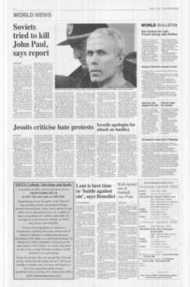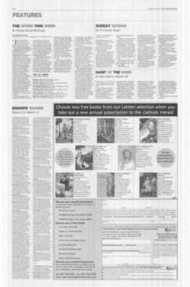Page 7, 10th March 2006
Page 7

Report an error
Noticed an error on this page?If you've noticed an error in this article please click here to report it.
Tags
Share
Related articles
Online Music For Reflection
'the Roadshows Are Over'
'i Blame Beethoven For Tracey Emin...'
Poland Talks May Lead To Visit By Pope Paul
`the Pope?
The trials of a court composer
Giuseppe Liberto, head of music at the Vatican, tells Igor Toronyi that, contrary to rumour, he enjoys the Pope's confidence
cep into the heart of the less salubrious east end of Vatican City, past a pharmacy, printing works and a tax-free supermarket, lies the modest second-floor apartment of Monsignor Giuseppe Libeller, Director of the Sistine Chapel Choir, the Pope's composer — and the Catholic Church's most senior musicmaker.
Mgr Liberto is a popular figure, and it's not hard to see why. Warm, excitable, incredibly generous, he seems to find it impossible to keep a straight face. The most innocuous questions produce strange witticisms and uproarious laughter.
Example: "Could you tell me about your early career?"
"How much do you want to pay me? Hahahahaha."
He greets me in long-lost nephew fashion, bear hug followed by two big smackers one on each cheek.
We had met once before. On this occasion, however, something isn't quite right. He appears preoccupied and slightly anxious.
"Some of my enemies are saying bad things about me," he says, unprompted.
"They're saying the Pope received me in order to criticise my work...This is completely absurd — really it is."
At the end of last year Pope Benedict XVI held a reception for the Sistine Chapel Choir and Mgr I.iberto.
In an improvised speech, Pope Benedict told the choir that it must "be an example of how to convey beauty in song, in praise of God... From here, [the people] learn or do not learn what the liturgy is [and] how the liturgy should be celebrated."
Certain Italian journalists took this to be a guarded reprimand of Mgr Liberto, who has been responsible for all the music at every papal liturgy and Vatican event since 1997.
Mgr Liberto, however, is at pains to make it very clear that there was no criticism involved. Indeed, he even bustles out of the room to find a copy of the Osservatore Romano containing the relevant speech.
He hit it off with Pope Benedict right from the start, he insists "Immediately after the Pope's inauguration, in the middle of his very first Mass at San Paolo fume la Mum, he went over to me and the choir and thanked us all for the music we had provided."
Suspicions have arisen partly from the belief that Cardinal Ratzinger intervened inl 997 to try to prevent the dismissal of Mgr Libeno's predecessor, Domenico Bartolucci, as maestro, Mgr Liberto is a moderniser, grumble the traditionalists.
And in some ways you can see why. lie tells me about the moment in 1974 when, attending a Christmas Eve Mass using Gregorian chant, he suddenly realised that this form was "completely redundant".
These days, his message is more nuanced. "Once upon a time people wanted us to sanctify only Gregorian chant and Palestrina, and that beyond them there was little else," he explains.
"It is now clear that there is, and that we cannot confine ourselves only to that type of music. To save the liturgy we have to create a new musical reality."
On the other hand, he concedes that Gregorian and Latin Chants are "part of our heritage which we mustn't forget or cast aside".
He also performs a lot of it. A Gregorian antiphony and Palestrina motet were performed at the papal reception. And, ironically, his favourite composers are the anonymous originators of Gregorian chant.
What is obvious is that Mgr Liberto thinks very seriously about sacred music. And despite his apparent modernising tendencies, his real aim is simple and rather traditional: to unite musical and liturgical functions.
"They must be born, then grow and develop together," he says.
Interpreting the musical intentions of the Second Vatican Council is, however, a difficult art, and requires an instinctive understanding of the liturgy.
Fortunately, Mgr Liberto is also a wordsmith: his musings on sacred worship have been published, as well as a book of poetry.
His own musical language is also very considered, despite an early period of experimentation (and an even earlier period of playing the accordion, a detail that reduces him to his usual helpless laughter). He tells me of the time, in 1975, when he went as far as composing a completely atonal Mass. It apparently didn't go down too well with the local Sicilian audience.
"All hell broke loose," he says, rolling his eyes. "Everyone was against it. You should have heard the things they said to me! It taught me that if you want to be radical, at least use an acceptable language."
His works now hint at Poulenc and Hindemith, applying 20th-century harmonies to ancient conventions.
What about those composers who don't use a suitable language for composing for the liturgy, I ask — those who use rock music or guitars to create unspeakably banal music?
"Well, anything that isn't beautiful has no part in the liturgy. I don't accept that rock music can be great music, and for the liturgy it's impossible to use. But there isn't only one type of beauty."
Should there be some sort of central authority to control and guide musical development within the Church, in order to stop some of these aberrations?
"When I hear the word control I come out in goose pimples," says the monsignor, visibly shuddering "I associate control with something sinister and depressing — someone saying No to everything. "We've got to experiment, not control and argue. The conflicts among liturgical musicians and composers have not produced anything of note."
And, boy, have there been conflicts. The Director of the Sistine Chapel Choir is in essence also a court cornposer. Where there is a court there is also intrigue. So it is with the Vatican.
When Mgr Liberto obtained his position eight years ago, many of his colleagues objected, to put it mildly.
As he recalls: "The people who were meant to be helping me were doing nothing of the sort, saying I'm not up to the job. The choirmasters were even putting the choirboys up against me.
Who were these people?
"I can only say that they were people who were angling to get my job, or those who had lost the possibility of getting my job."
Yet, despite Mgr Liberto's modernising bent, Pope Benedict appears to be — for the moment — on his side.
"We hosted the Pope's brother when he came to the Vatican. The next day, we met the Pope, and he held my hand and, looking into my eyes said: 'My brother has told rue all about you. I want to meet you all as soon as possible.' So we arranged a meeting with him for December 20.
"It was the first time in 25 years that the Sistine Chapel Choir had been received by the Pope.
"At the meeting he gave us a heartfelt and personal thank you for all we had done, and then... you know what happened? Something extraordinary, something really extraordinary.
"From the other end of the chapel, through the far door, came a huge cake and two baskets of chocolates from Austria. Jokingly the Pope said: 'To the music maestro I give this."
Suddenly, Mgr Liberto produces a chocolate violin from behind his back, giggling loudly and grabbing my arm.
"He is the greatest of theologians, the greatest of priests, the greatest Papa," he adds, barely able to speak for chuckling.
And a great pianist? "I haven't heard him, but I would love to conduct him in a concerto.
"How could anyone suggest, after all I've said to you, that the Pope said nefarious things about me; that he invited us all in order to criticise us? How?"
Has he ever thought of turning his back on all the intrigue and retiring?
"I conic from Sicily. I've become accustomed to the anti-Mafia," he says cryptically.
Framed on his wall is a letter from one of his ancestors — Napoleon Bonaparte. Whether that is a good omen remains to be seen.
blog comments powered by Disqus

















